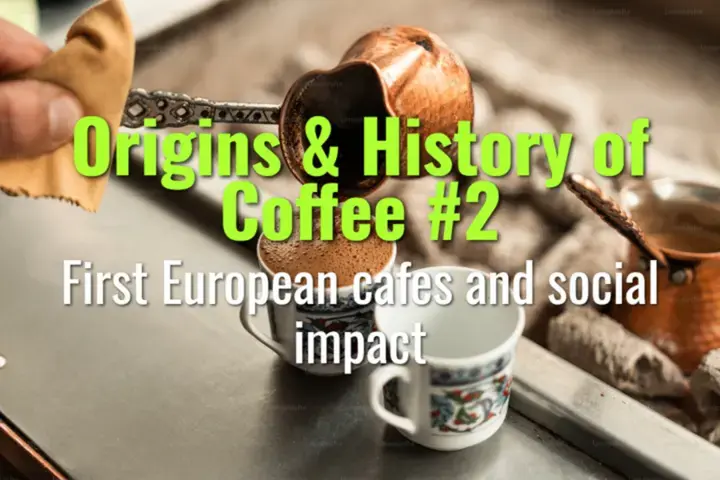First European cafes and social impact
This topic explains how coffee arrived in Europe, the establishment of its first cafes, and the profound social and cultural transformations they triggered across the continent.
- Coffee Basics Nerds
- 2 min read
Article 2 of 9 in Origins & History of Coffee/

Arrival of Coffee in Europe
- Venice as a gateway: By the early 1600s, Venetian merchants imported coffee from Ottoman ports. Initially sold as a medicine, it quickly gained popularity as a stimulating beverage.
- Church debates: At first, coffee was condemned by some as the ‘bitter invention of Satan,’ but Pope Clement VIII famously tasted it and approved, paving the way for wider acceptance.
Birth of European Coffeehouses
- Venice (1645): First permanent European coffeehouse opened, attracting merchants and nobles.
- Oxford (1650s): The “Angel Inn” and later Oxford’s Penny University allowed anyone to buy coffee and engage in scholarly talk for a penny.
- London (1652): Pasqua Rosée established London’s first coffeehouse, which multiplied rapidly; by 1700, there were over 500 coffeehouses.
- Paris (1686): Café Procope became a center for Enlightenment intellectuals, frequented by Voltaire, Rousseau, and Diderot.
Social Impact
- Intellectual hubs: Coffeehouses earned the name “penny universities” for their role in democratizing knowledge. Anyone with a coin could join debates, hear lectures, and exchange ideas.
- Economic centers: Merchants and traders used coffeehouses as informal exchanges. London’s Lloyd’s Coffeehouse became the foundation of Lloyd’s of London, a global insurance market.
- Political forums: They were places where newspapers circulated freely and political pamphlets were debated. Governments sometimes feared them as breeding grounds of dissent.
- Cultural shift: Coffeehouses promoted sobriety compared to taverns, fostering a culture of reason, conversation, and commerce over alcohol.
Lasting Legacy
- European coffeehouses shaped the Enlightenment, nurturing modern journalism, science, finance, and democratic debate.
- They set the model for the public café culture we know today, blending social life, intellectual exchange, and business.
Key Figures and Places
- Pope Clement VIII – legitimized coffee for Christians.
- Pasqua Rosée – opened London’s first coffeehouse.
- Café Procope, Paris – cradle of Enlightenment discussion.
- Lloyd’s Coffeehouse, London – seed of global insurance industry.
Summary
The first European cafes transformed coffee from a foreign curiosity into a catalyst of intellectual, economic, and political life. They offered a new social space where commerce, science, and democracy could flourish over a simple cup.
You might also like:
- Tags:
- Lasting Legacy